Wagner: Tristan und Isolde (Schneider)
Introduction
Here is the third Tristan on the Opus Arte label (on my watch at least), and finally we are able to see what they get up to in the home of Wagnerian opera.
This performance was broadcast live over the internet last August, but unfortunately was a production directed by Christoph Marthaler, someone who, despite being a musician, seems unable to take on board that it may be a good idea to just take things literally, read the score, and not become all 'metapysical' about the job in hand.
The story of an Irish princess, captured by the Cornish hero Tristan as a prize for his King remains, but you would be forgiven for wondering whether something had gone horribly wrong in the creative process.
Audio & Visual
I was very impressed by how, even within what seemed to be a relatively confined space, the cameras could get to places many live relays don't manage. They may well have got in the way of the view of the live audience, but as a home viewer wasn't my concern.
Video quality is also excellent, and comes across as if it were a live broadcast being beamed into your room at the time.
Sound is a different matter though, as you get the full force of Wagner's unprecedented orchestration at the cost of many of the vocal lines. I'm not too concerned about this however, as you can hear things as they were in the theatre (judging by contemporary reports) on the day and I'm sure the composer would have approved …for the most part.
It's a shame that despite the fantastic sound the orchestra makes most of the time, there are moments, such as the opening of Act 2 when the principal oboe and clarinet are very wayward in the duplet/triplet figures (and their mics seem to have been brought to the fore as well, which made it all the more obvious).
Extras
A half-hour 'making of' entitled "Kinder, macht was neues!". This is translated as "Children, do something new!", and is a quote lifted from a letter Wagner wrote to Liszt. Many opera directors have taken this to mean they can rip the original concept of Wagnerian music drama to shreds, and I'm afraid Marthaler is no exception.
The short programme includes the usual rehearsal footage, and there is some attempt to justify the production, although Robert Dean Smith is honest enough to say (speaking German in a very American accent) that sometimes things are not always appreciated by the great unwashed in the stalls, and that a chorus of disapproval at the curtain calls can be a bitter pill to swallow.
Conclusion
This disapproval was made very clear in the first performance of the production 4 years beforehand, but perhaps the Bayreuth audience has softened over the years, putting up with the drabness of the sets and everything else, concentrating on just the music itself. Maybe this is what Marthaler had in mind in the first place, but judging by subsequent reviews, things had been changed gradually over the years and even in the filmed extra, Anna-Sophie Maler (not 'Mahler', as in the booklet) admits that it's a 'work in progress'. Maler is the 'Revival Director'. I take this to mean that Marthaler has done a runner, leaving an assistant to tidy things up…or indeed, take the flak.
The most noticeable thing about the production is the drabness that enshrouds the proceedings.
Act 1 is at least set on some sort of boat, as we can tell by the rolling of something or other around the floor post-Prelude. It's a shame it's more like a cross-channel ferry from the 1960s that has seen far better days, rather than a sail-ship worthy of an all-conquering Medieval hero. Isolde and Brangäne are 'locked up' in a large, empty bar-like room on board and are dressed in what can only be described as a 'frumpy' set of outfits. Even the hairstyles (which change for each act) are appalling, with Michelle Breedt (Brangäne) looking the spitting image of her who isn't Kate Winslet in Peter Jackson's 'Heavenly Creatures'.
The second act takes place one 'deck' below. This is an empty room, save two seats. The wallpaper is a distressed yellow, and the parquet wooden floor is similar to that of an old primary school hall (that acted as a gym when it rained).
Act 3 is one 'deck' down again, and appears to be a run-down medical area with bare, scratched graffitied walls with a single hospital bed.
The director's demands on the actors are even worse. For one of the most erotically-charged and romantic stories ever set to music (and this is the music which rewrote the rules about eroticism and romance) there a distinct lack of.well, contact between the two protagonists. One brief passionate hug at the beginning of the great love duet in Act 2, and that's about it. A semblance of 'normality' appears to set in when Tristan is cradled in Isolde's lap and takes off her glove, but again, this leaves the viewer cold as there's little or nothing in the way of eye contact.
Act 3 promises drama, but delivers precious little. The great battle between the armies of Kurwenal and Melot looks as if it's all in someone's head (probably Kurwenal's, judging by his embarrassing 'fighting' movements) and those who die, or are no longer needed for the final scene just stand facing the walls like naughty schoolchildren.
Luckily, there is a huge amount to admire in the musical performances, and this just about tips the scales in the DVD's favour.
As I've mentioned, the balance between orchestra and stage favours the pit rather too much, but then with singers such as Iréne Theorin, whose voice is full of passion, lyricism and all the needed power in the top notes, you're not going to miss too much of what goes on. This is a committed performance from the off, and despite a few strained and slightly sharp climaxes, is one of the best performances I've seen. Even Marthaler's ridiculous suggestions don't cramp her style too much, but I would have liked a less 'muffled' beginning to the 'Liebestod', which is hard enough to sing in the first place, but delivered horizontally on Tristan's deathbead is plain stupid.
Robert Dean Thomas lasts the distance well, with only a few stamina issues appearing in the second act. His is a restrained Tristan, maybe down to the fact that the character doesn't seem to do much apart from stand and sing, but even then, the acting is a tad wooden. Close your eyes though, and you'll be far more impressed.
I enjoyed Jukka Rasilainen's Kurewenal immensely. The character is a more elderly retainer than I've seen in other productions, and the skilful acting reflects this. His voice is powerful, with great depth to the sound and the German diction is amazing, something which should really have been clearer from the two leads.
It's great to see Robert Holl as King Marke, as I'm far more used to his voice in Bach Cantatas. It's a shame therefore that his voice doesn't suit this role at all. It wavers and shakes and doesn't have the intensity the part requires. There's a lot to admire in the musicality, but I have a horrible feeling there may have been a bit of a sympathy vote in this casting.
Michelle Breedt, despite some shrillness (offstage) towards the end of Act 2, makes a fine Brangäne. Her facial expressions run the gamut from A to B , but her voice shines through, especially when battling against her mistress in Act 1.
Ralf Lukas (Melot) is a suitably sneering and nasty piece of work and provides a strong foil for Marke's compassion.
And then there's the conducting, and all that goes with it.
Peter Schneider pulls and pushes where necessary, and makes some grand gestures, but I was left a bit cool by his interpretation. The Prelude is lovely, and when played over scenes of the stage lights looking like galaxies, creates exactly the right mood for the story to follow. It's a shame then that I just got the sense of the 'ordinary' about everything, and I suspect this may be because of the quality of the orchestral playing overall. Despite being the orchestra that is booked especially to play in the annual festival, there's a great deal to be said for booking a full-time band for occasions such as this as here, the playing sounds exactly like a lot of very fine musicians have been bundled together without getting used to playing together.
Perhaps this is unfair, but with all due respect to the organisers of the Bayreuth Festival (and yes, the Wagners are still at the helm), an annual application for tickets which may only be successful in 5 or 10 years deserves more thought about what people are going to see and hear.
Having said all that, I think it's worth watching. Musically, it's a passionate and dedicated performance despite any issues which will arise from any live show or dreadful production, and which I've picked on fairly mercilessly. The fact that it's a record of a single night's production from the 'home' of Wagner operas speaks volumes, but if Bayreuth's intention is to be the cutting edge within its field then a lot of work needs to be done to make things fresher and more relevant. Nowadays, eveyone is putting on these works, often with considerably more success. The Wagner dynasty needs to realise they no longer have the monopoly on great-grandaddy's output and so have to pull their finger out. If Opus Arte is there to record future productions then it will be better for everyone.
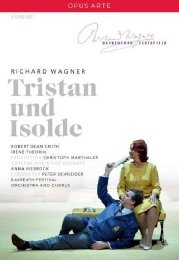
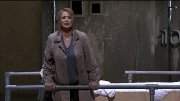
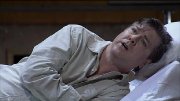
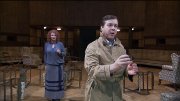
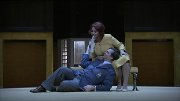
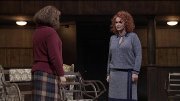
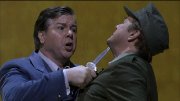
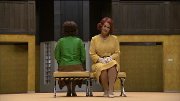
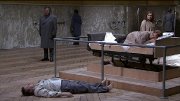
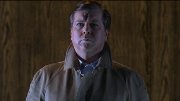







































Your Opinions and Comments
Be the first to post a comment!